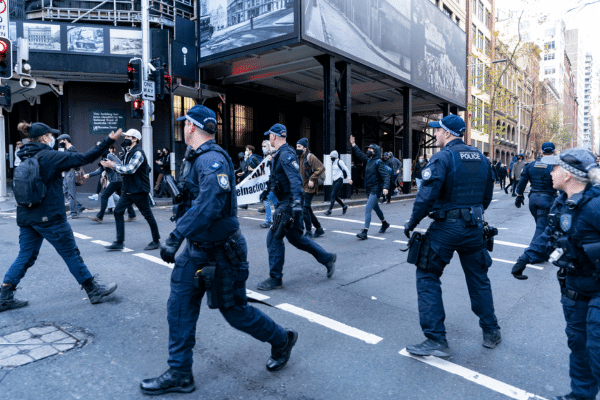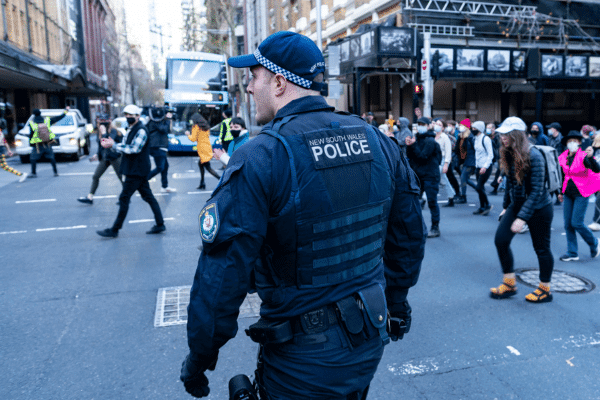In news that should surprise no one, a recent report has found that NSW Police heavily and disproportionately fined children, people from disadvantaged backgrounds and those from lower socio-economic areas for alleged COVID-19 public health order breaches during the 2020-2022 lockdowns. Of the top 30 suburbs where children were issued fines, none of those suburbs were in Sydney’s wealthiest areas.
Now perhaps you’re of the view that as sad as disproportionate fines are, those people breached the rules the most, whilst the rest of us complied. So tough luck. Right? Now I could write a long rant about how affluent suburbs brazenly breached lockdown with little enforcement, and that compliance in Western Sydney was in fact high, but it turns out I already did just that in 2021. Indeed subsequent data from the NSW Bureau of Crime Statistics and Research backs up the theory. Vindication. Yay.
But perhaps you don’t fall into that camp but nonetheless feel tempted to roll your eyes. Are we still talking about COVID? Maybe you’re even sympathetic to the outrage but also… surely it’s time to move on, COVID feels like a lifetime ago?
Honestly, I get that. But as someone who witnessed first-hand what the over policing of Western Sydney did to my community, reports of disproportionate police enforcement are not just about vindication. The punitive and brazenly discriminatory police response during COVID has, as predicted, left feelings of distrust in police within our community that persists to this day, especially amongst more vulnerable populations. Resolving that distrust is vital from a law and order standpoint, and begins with something very simple. Accountability.

Too often, ‘accountability’ sounds like a demand for heads to roll, resignations and a public hounding of those responsible. That is not what I mean by accountability here. Indeed, as furious as our communities deserve to be when seeing reports like this, police do have an extremely difficult job, especially in an unprecedented pandemic. It also must be noted that the over policing of Western Sydney was a direct result of previous state Liberal Government policy.
However, when independent research highlights that NSW Police issued over 3,500 fines to children during the pandemic, with a disproportionate amount issued to children from vulnerable backgrounds, serious questions need to be asked. When the highest proportion of those fines were issued in some of the state’s most disadvantaged areas, serious questions need to be asked. Where police issued children with penalties of over $5000 when the maximum that can be fined in the NSW Children’s Court is only around one-fifth of that, it plainly demonstrates that there has been an overreach, and police have acted punitively against disadvantaged kids. One can safely say that these reports do not sow seeds of trust and ought to warrant some serious introspection from NSW Police.
Unfortunately, instead of a basic apology and setting the groundwork for reform to recover community trust, the NSW Police response to the report’s findings is as disappointing as it is predictable. Defend and double down.
Reported by The Daily Aus, NSW Police defended their actions and stated their enforcement was to ensure compliance and was in protection of the community. Notwithstanding the response appears tone deaf and entirely fails to deal with the extremely concerning findings of the report, it’s an extremely poor move from a strategic perspective.
View this post on Instagram
NSW Police would be well aware that repairing community trust is vital from a law and order standpoint. Indeed, a trusting relationship between the community and police is a necessary precondition to improving the reporting of crime and cooperation with law enforcement, especially during times of civil unrest and disruption. Vague public statements and a refusal to properly confront these damning reports only worsens the divide between police and the very communities they need to work with. A basic apology coupled with sensible reforms are a basic first step to recovering trust. Failing to do so allows the ghosts of COVID to continue to linger, and harms both the police and our communities for the foreseeable future.
For if NSW Police cannot honestly reflect on the disproportionate exercise of their powers, how can vulnerable communities ever believe they will not suffer in the same way again? How can those communities feel police are on their side? How can they forgive that which the NSW Police are not sorry for?
COVID may be a nightmare from the past, but if NSW Police do not seriously reflect on this report, those scars will continue to fester and the divide between community and police will only grow – an outcome that is worse for all of us.
READ ALSO: Indian-American cop shot amid growing anti-police sentiments





